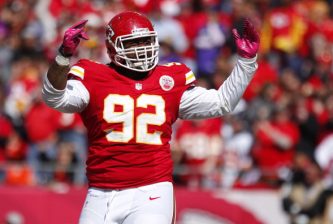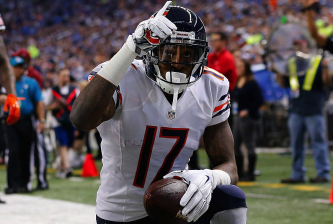The NFL has basically acknowledged that its rules regarding the process of a catch aren’t perfect, but very rarely are better options brought to the table. That’s why we as fans bitch and complain without really offering solutions for how the league can make it so plays like Dez Bryant’s non-catch won’t happen without opening up any cans of worms.
Maybe there will be enough momentum for a revolutionary change—for a catch to be catch as soon as a receiver gets two feet down and possesses the ball clearly. The problem with that in the past, as another source said Sunday, is “the cheap fumble.” Think of what happens when a pass, a catch by a receiver, a thudding hit by a defender and a fumble all occur at lightning speed. Did the receiver actually have possession before getting whacked and losing control of the ball? I can recall Jeff Fisher and Rich McKay, the Competition Committee co-chairs, explaining the debate over the rule at one recent meeting and saying, basically, We all agree we don’t love this current rule. We just don’t have a better one. It’s not an easy problem to solve.
But when the competition committee reviews the process of the catch rule this offseason, I have one potential solution: Make it a judgement call.
As things stand right now, officials follow a strict yet strange set of guidelines when deciding whether a receiver completed a catch all the way through the required process. Did he maintain possession? And if he didn’t, did he perform, as referee Gene Steratore stated Sunday, “another act common to the game” before doing so? If that’s the case, it’s either a fumble (if he’s yet to hit the ground) or he’s down by contact (the ground can’t cause a fumble, only an incomplete pass).
But Bryant claimed he was indeed committing an “act common to the game” when he was lunging out toward the end zone with the ball, and it wasn’t until then that he lost total control of it. The league’s definition of an act common to the game seems to differ from the definition we’d use in our backyards, which is extremely problematic.
As ESPN.com’s Kevin Seifert explains, the league’s definition doesn’t cover players for acts they make while falling:
In this case, Bryant took two steps and lunged toward the goal line. Why was this not an “act common to the game”? Because, by NFL rules, Bryant did it while going to the ground. He never established himself as “upright.” Steratore, in Sunday’s official pool report, said: “In our judgment, [Bryant] … continued to fall and never had another act common to the game.”
And that’s just dumb.
These officials are smart enough to apply common sense and utilize their own judgement on these plays, just as they do when deciding if pass interference or roughing the passer occurred. They should check to ensure that a player gets two feet down while controlling the ball during that process. If he falls without doing anything else and the ball is jarred loose, it’s incomplete. If upon replay or in real time it is determined that the ball came loose only because he was trying to make a football move (a lunge, etc.) while falling, that should be a complete pass.
It won’t always be black and white, but officials should be able to make sure that the basic criteria is met before using their own two eyes to determine whether it makes intuitive sense to uphold or overturn their original decision.
And even if that decision is made on the spot, there’s no reason it shouldn’t be reviewable. Bill Belichick wants all calls — including those made based on judgement — to be up for potential challenges, and I see no reason why that shouldn’t be the case. If a coach sees something he thinks an official missed, he should have the right to use one of his challenges in order to get the referee and NFL officiating czar Dean Blandino to take another look.
It’s time to simplify the entire over-complicated rulebook, starting here. Two feet down and the ball under control? That’s a catch. Does the ball come loose afterwards? Let the highly-paid officials use their common sense and expertise to make that decision, rather than forcing them to follow a protocol that is far too set in stone.




